It features daily, in the mainstream media all over the world: stories about the cheating accusations raised by World Champion Magnus Carlsen against young upstart Hans Niemann. Europe's largest and most influential news magazine and portal has done multiple reports – the latest features a portrait of the accused. It is in German and behind a paywall. But we bring you excerpts, with kind permission.

The career of Hans Moke Niemann
But is his rise from the world's 1000 to the top 50 really that special? To cut a long story short: It is usually unusual. To understand that, you have to look at his story.
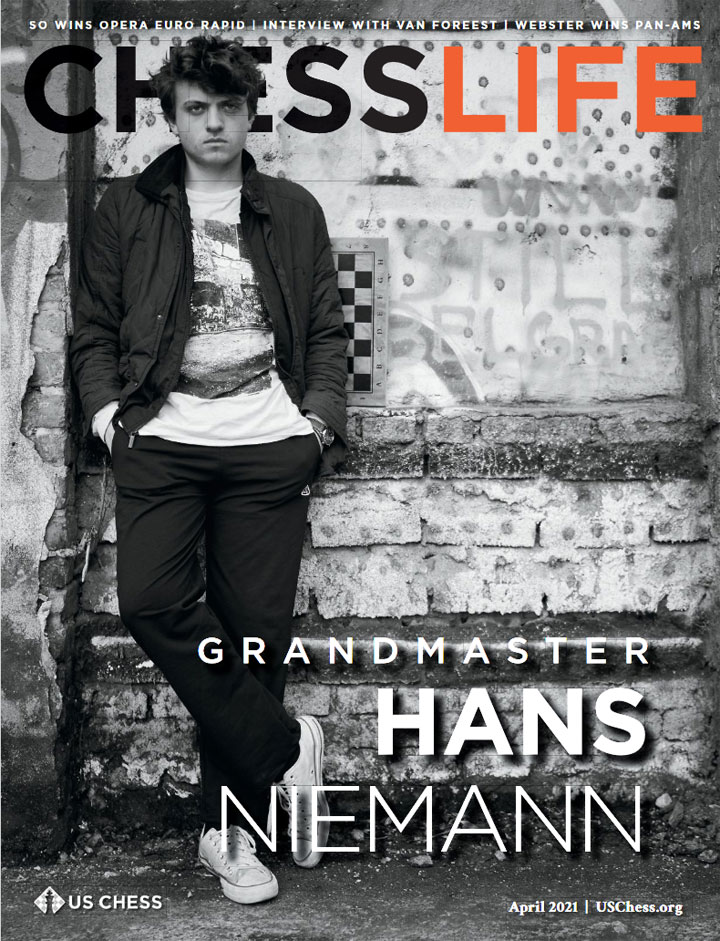 Hans Moke Niemann was born in San Francisco in 2003. His parents, the mother from Denmark, the father from Hawaii, worked as IT managers. For professional reason they the family emigrated to the Netherlands. Hans learned chess at the age of eight, comparatively late when compared to other grandmasters. He was then quickly discouraged when his chess teacher did not allow him to represent his school in the national championships, Niemann later wrote in an article for the magazine "Chess Life". He preferred to devote himself to cycling, racing dozens of times.
Hans Moke Niemann was born in San Francisco in 2003. His parents, the mother from Denmark, the father from Hawaii, worked as IT managers. For professional reason they the family emigrated to the Netherlands. Hans learned chess at the age of eight, comparatively late when compared to other grandmasters. He was then quickly discouraged when his chess teacher did not allow him to represent his school in the national championships, Niemann later wrote in an article for the magazine "Chess Life". He preferred to devote himself to cycling, racing dozens of times.
After the family returned to the USA, Hans, now nine years old, returned to chess. "I played a little over 100 tournaments in my first year back in the USA," he later recalled. He shot up the rankings, thanks in part to his mentor Maxim Dlugy, a Russian-born US grandmaster. "He was a traditional Soviet-style chess coach. He showered me with a lot of information and I soaked it up like a sponge," Niemann said in the "Chess Life" podcast. With him he raised his game to a higher level as a teenager, up to 2400 points in the world rankings.
After a quick rise, Niemann's performance stagnated. On the one hand because of a lack of training, he says: his "curriculum" at times consisted of an American football game on the iPad, Netflix and a 15-minute look at chess books by Garri Kasparov. And on the other hand, the boring lessons at school had kept him away from chess. The turning point came for Niemann at the age of 16. He moved alone to New York City, went there thanks to a chess scholarship to a public school and earned money as a chess coach and Twitch streamer. But Niemann gave that up to pursue his dream: He wanted to become a professional chess player.
To achieve his goal, he rearranged his life. Getting up around 7 a.m., going swimming, then ten to twelve hours of chess training, eating on the side. He hardly had a social life outside of chess anymore, he said. Niemann learned and played a lot - and came to success with a courageous style. In October 2020, he was in the haze of the best 1000 players in the world with 2465 Elo points; today he is a grandmaster and is 49th in the world rankings with 2688 Elo points.
The rise
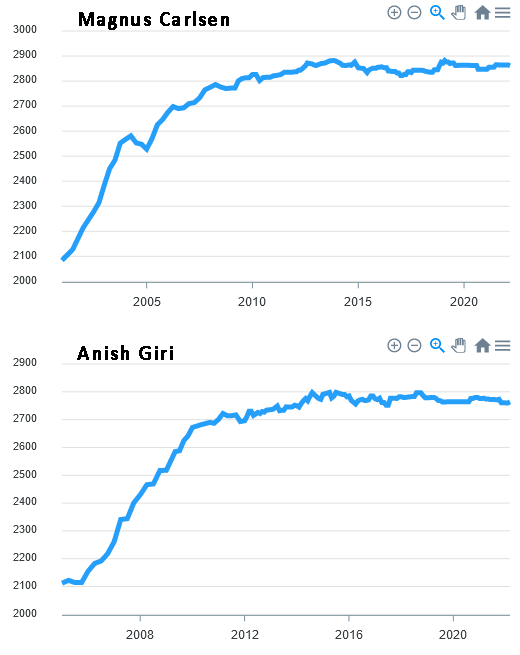 It is this rise of about 200 Elo points that some find suspicious. Yet it is not so extraordinary, according to former world champion Viswanathan Anand, among others. "Since there are a lot of promising young players who make dramatic leaps, he didn't particularly stand out for me," he told SPIEGEL.
It is this rise of about 200 Elo points that some find suspicious. Yet it is not so extraordinary, according to former world champion Viswanathan Anand, among others. "Since there are a lot of promising young players who make dramatic leaps, he didn't particularly stand out for me," he told SPIEGEL.
Data surveys show that other grandmasters before Niemann made leaps from 2475 to 2675 Elo points even faster, such as super-grandmaster Anish Giri – or Magnus Carlsen himself. Niemann's performance is extraordinary compared to good chess players, but plausible in comparison with the top players.
Players.chessbase.com
We generated the curves above (click to enlarge) on the ChessBase Players Encyclopedia. There you can visualize the progress of any player in the FIDE list.
So what does the rating progress of Hans Niemann look like, and how does it compare to other top talents in the current chess world? (Click ll images to enlarge)
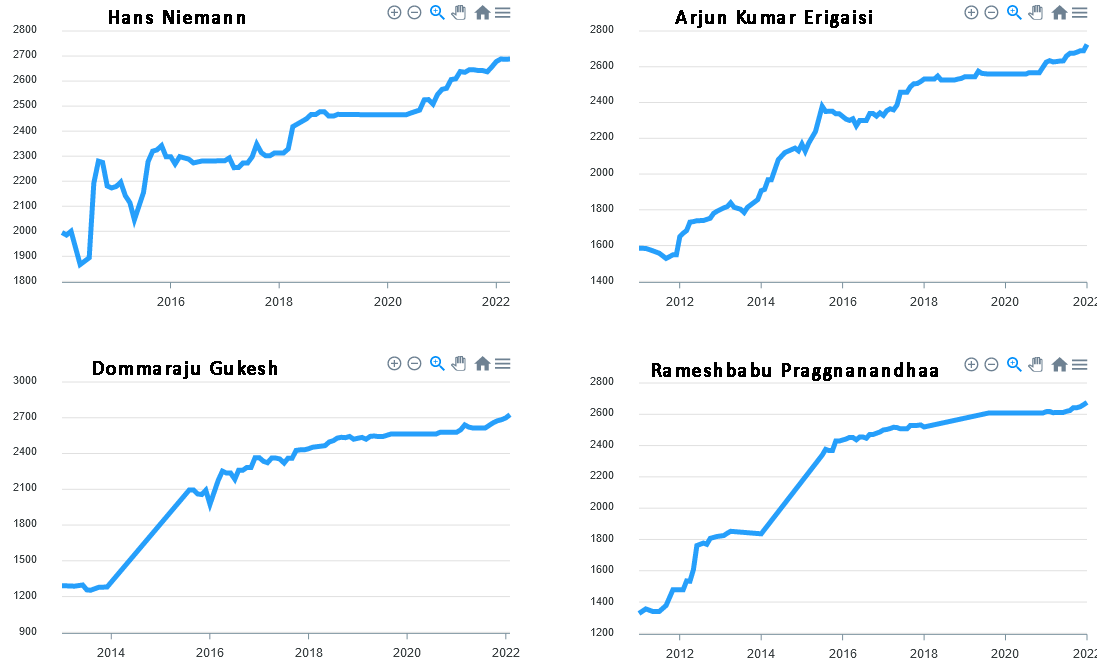 Note that Hans Niemann and Arjun Erigaisi are both of the same age. Arjun is on an even steeper meteoric path and is now the second-highest ranked Indian grandmaster – and number eighteen in the world.
Note that Hans Niemann and Arjun Erigaisi are both of the same age. Arjun is on an even steeper meteoric path and is now the second-highest ranked Indian grandmaster – and number eighteen in the world.
If you visit the ChessBase Players page, you will see that it has many additional functions. Let me show you some, using a dear friend from Holland as an example.
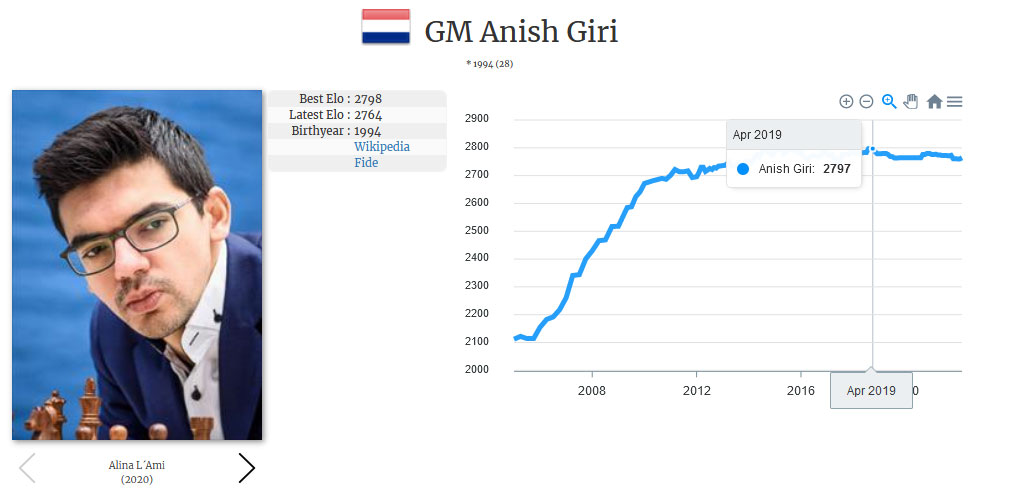
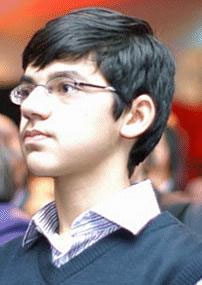 There are 20 pictures of Anish you can flip through. Here's one of the earliest, taken in 2010, when he was 15.
There are 20 pictures of Anish you can flip through. Here's one of the earliest, taken in 2010, when he was 15.
Moving your cursor over the progress curve will display the exact date when his ratings were achieved. For instance in April 2019 he reached 2797.
Now comes the interesting part. When we showed it to a top-ten grandmaster a few days ago his reaction was: "Hey, that is fantastically useful. I didn't know this function!" Which is why we are telling our readers about it here.
When you scroll down this is the first section you see:
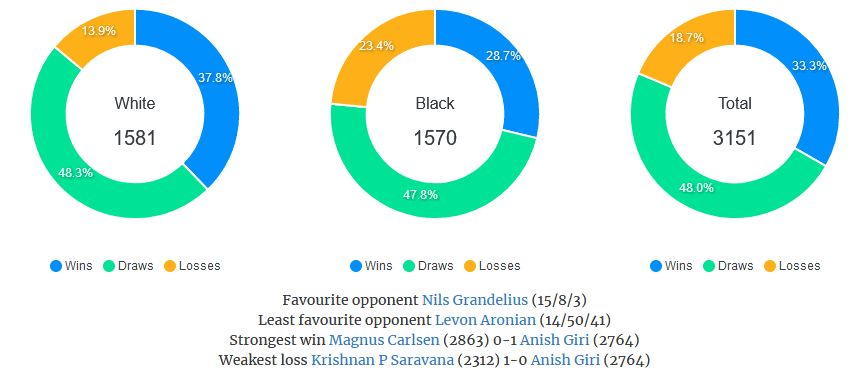 It shows you how Anish has scored with white, black and in total. It also displays his favourite and least favourite opponent, and his most dramatic wins and losses. Scroll down further and you get the following:
It shows you how Anish has scored with white, black and in total. It also displays his favourite and least favourite opponent, and his most dramatic wins and losses. Scroll down further and you get the following:
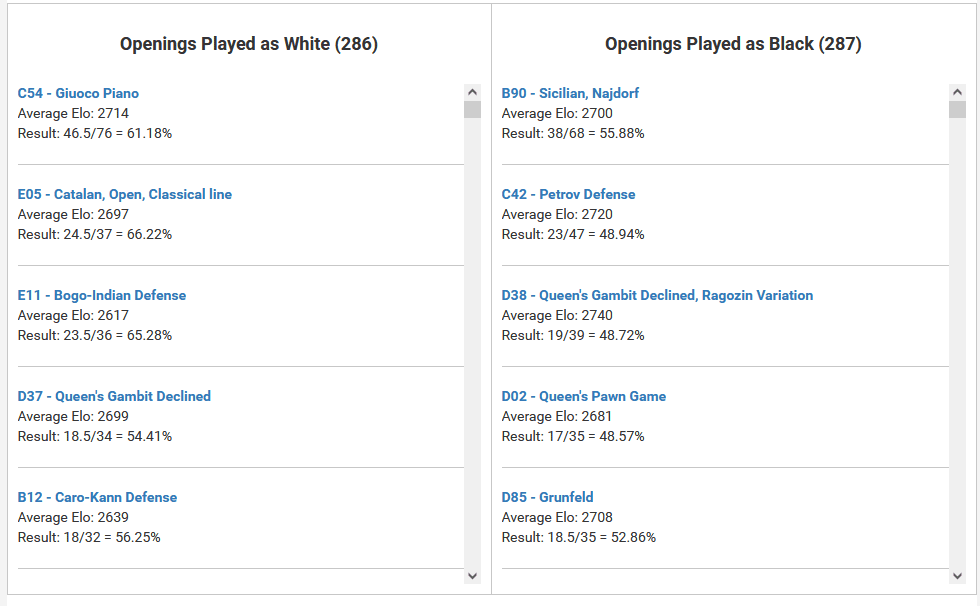 "Oooh," said our top ten GM, "what happens when I click a link?"
"Oooh," said our top ten GM, "what happens when I click a link?"
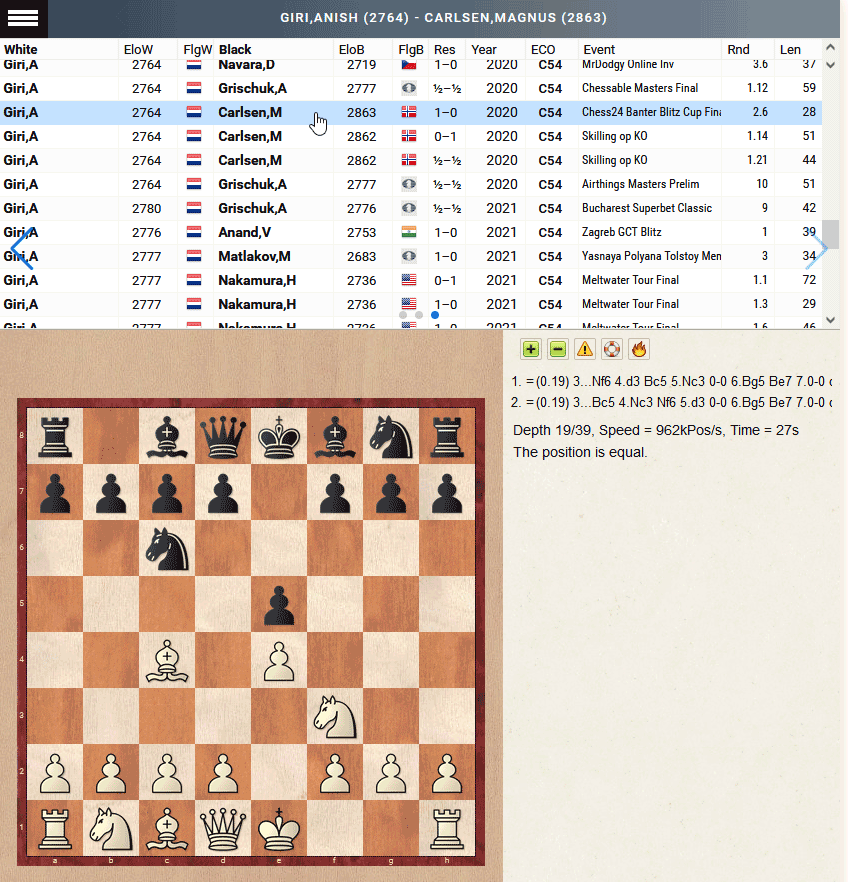
You get a list of Giri games in the relevant opening, e.g. the C54 Gioco Piano, in which he scored - 46.5/76 = 61.18% against opposition rated an average 2714. You can load games from the list, and even start an engine to analyse. "Oooh", said our top player, whom I expect to climb even higher on the rating list now that he knows this feature.
If you, too, want to make use of this utility, you can see all the functions described in the report: Online Player Encyclopedia - Players, profiles, and pictures (with video!)
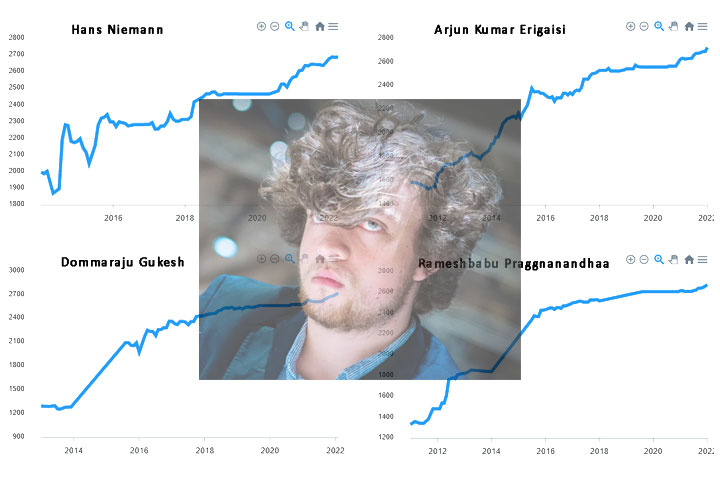


















 Hans Moke Niemann was born in San Francisco in 2003. His parents, the mother from Denmark, the father from Hawaii, worked as IT managers. For professional reason they the family emigrated to the Netherlands. Hans learned chess at the age of eight, comparatively late when compared to other grandmasters. He was then quickly discouraged when his chess teacher did not allow him to represent his school in the national championships, Niemann later wrote in an article for the magazine "
Hans Moke Niemann was born in San Francisco in 2003. His parents, the mother from Denmark, the father from Hawaii, worked as IT managers. For professional reason they the family emigrated to the Netherlands. Hans learned chess at the age of eight, comparatively late when compared to other grandmasters. He was then quickly discouraged when his chess teacher did not allow him to represent his school in the national championships, Niemann later wrote in an article for the magazine " It is this rise of about 200 Elo points that some find suspicious. Yet it is not so extraordinary, according to former world champion Viswanathan Anand, among others. "Since there are a lot of promising young players who make dramatic leaps, he didn't particularly stand out for me," he told SPIEGEL.
It is this rise of about 200 Elo points that some find suspicious. Yet it is not so extraordinary, according to former world champion Viswanathan Anand, among others. "Since there are a lot of promising young players who make dramatic leaps, he didn't particularly stand out for me," he told SPIEGEL. Note that Hans Niemann and Arjun Erigaisi are both of the same age. Arjun is on an even steeper meteoric path and is now the second-highest ranked Indian grandmaster – and number eighteen in the world.
Note that Hans Niemann and Arjun Erigaisi are both of the same age. Arjun is on an even steeper meteoric path and is now the second-highest ranked Indian grandmaster – and number eighteen in the world.
 There are 20 pictures of Anish you can flip through. Here's one of the earliest, taken in 2010, when he was 15.
There are 20 pictures of Anish you can flip through. Here's one of the earliest, taken in 2010, when he was 15. It shows you how Anish has scored with white, black and in total. It also displays his favourite and least favourite opponent, and his most dramatic wins and losses. Scroll down further and you get the following:
It shows you how Anish has scored with white, black and in total. It also displays his favourite and least favourite opponent, and his most dramatic wins and losses. Scroll down further and you get the following: "Oooh," said our top ten GM, "what happens when I click a link?"
"Oooh," said our top ten GM, "what happens when I click a link?"





